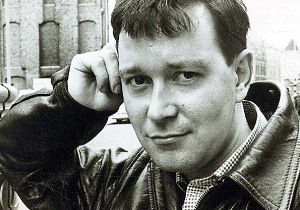
John Kingsley Orton, known by the pen name of Joe Orton, was an English playwright, author, and diarist.
Amicus Productions was a British film production company, based at Shepperton Studios, England, active between 1962 and 1977. It was founded by American producers and screenwriters Milton Subotsky and Max Rosenberg.

Quatermass and the Pit is a British television science-fiction serial transmitted live by BBC Television in December 1958 and January 1959. It was the third and last of the BBC's Quatermass serials, although the chief character, Professor Bernard Quatermass, reappeared in a 1979 ITV production called Quatermass. Like its predecessors, Quatermass and the Pit was written by Nigel Kneale.

The Wednesday Play is an anthology series of British television plays which ran on BBC1 for six seasons from October 1964 to May 1970. The plays were usually original works written for television, although dramatic adaptations of fiction also featured. The series gained a reputation for presenting contemporary social dramas, and for bringing issues to the attention of a mass audience that would not otherwise have been discussed on screen.

The Sorcerers is a 1967 British science fiction horror film directed by Michael Reeves, starring Boris Karloff, Catherine Lacey, Ian Ogilvy, and Susan George. The original story and screenplay were by John Burke.

The Limping Man is a 1953 British second feature ('B') film noir directed by Cy Endfield and starring Lloyd Bridges, Moira Lister and Leslie Phillips. The film was made at Merton Park Studios and was written by Ian Stuart Black and Reginald Long based on Anthony Verney's novel Death on the Tideway. Endfield directed it under the pseudonym Charles de Lautour due to his blacklisting in Hollywood. Location shooting took place around London including The Mayflower pub in Rotherhithe.
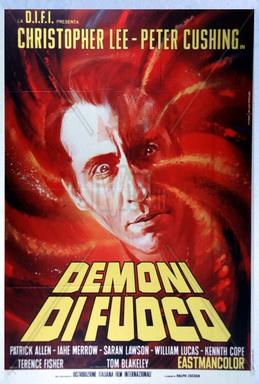
Night of the Big Heat is a 1967 British science fiction film directed by Terence Fisher, and starring Patrick Allen, Christopher Lee, Peter Cushing and Jane Merrow.It was based on the 1959 novel of the same name by John Lymington, and was released in the UK by Planet Film Productions.

Hell Is a City is a 1960 British crime thriller film directed by Val Guest and starring Stanley Baker, John Crawford and Donald Pleasence. It was written by Guest based on the 1954 novel of the same title by Maurice Procter, and made by British studio Hammer Film Productions on location in Manchester. It was partly inspired by the British New Wave films and resembles American film noir.

It's Great to Be Young is a 1956 British Technicolor musical comedy film directed by Cyril Frankel and starring Cecil Parker and John Mills. It was written by Ted Willis. The story concerns an inspirational school music teacher. Although the movie was very successful it has been described as "almost forgotten" today.

The Good Die Young is a 1954 British crime film directed by Lewis Gilbert and starring Laurence Harvey, Gloria Grahame, Joan Collins, Stanley Baker, Richard Basehart and John Ireland. It was made by Remus Films from a screenplay by Vernon Harris and Gilbert based on the 1953 novel of the same name by Richard Macaulay. It tells the story of four men in London with no criminal past whose marriages and finances are collapsing and, meeting in a pub, are tempted to redeem their situations by a robbery.

A Diary for Timothy is a 1945 British documentary film directed by Humphrey Jennings. It was produced by Basil Wright for the Crown Film Unit. The narration, spoken by Michael Redgrave, was written by Jennings and E. M. Forster and is an account of the progress of the war during the first six months of the life of a baby named Timothy.
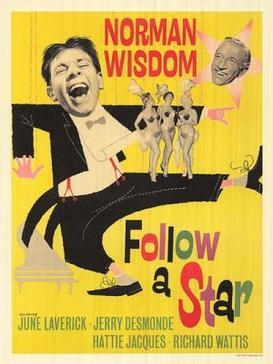
Follow a Star is a 1959 British black and white comedy musical film directed by Robert Asher and starring Norman Wisdom, June Laverick and Jerry Desmonde. It was written by Henry Blyth, Jack Davies and Wisdom.
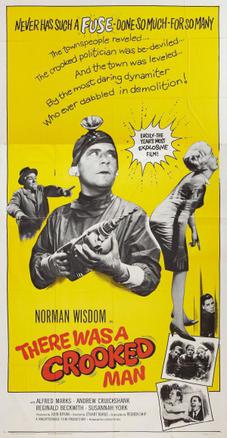
There Was a Crooked Man is a 1960 British comedy film directed by Stuart Burge and starring Norman Wisdom, Alfred Marks, Andrew Cruickshank, Reginald Beckwith and Susannah York. It is based on the James Bridie play The Golden Legend of Schults. The film was one of two independent films in which Wisdom appeared in an effort to extend his range, as British audiences strongly identified him with his Gump character.
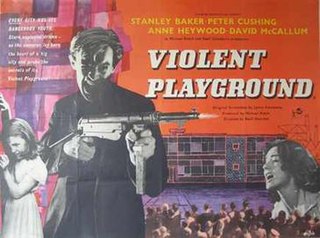
Violent Playground is a black and white 1958 British film directed by Basil Dearden and starring Stanley Baker, Peter Cushing, and David McCallum. It was written by James Kennaway.

Piccadilly Incident is a 1946 British drama film directed by Herbert Wilcox and starring Anna Neagle, Michael Wilding, Coral Browne, Edward Rigby and Leslie Dwyer. It was written by Nicholas Phipps based on a story by Florence Tranter.
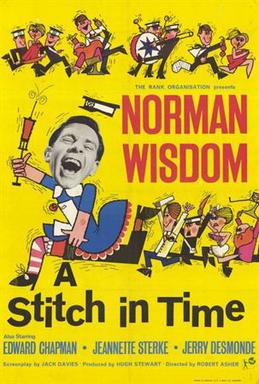
A Stitch in Time is a 1963 comedy film directed by Robert Asher and starring Norman Wisdom, Edward Chapman, Jeanette Sterke and Jerry Desmonde. It was produced by Hugh Stewart and Earl St. John. The film is set in a children's hospital and features an early role for Johnny Briggs.

Whispering Smith Hits London is a 1952 British second feature ('B') mystery film directed by Francis Searle and starring Richard Carlson, Greta Gynt and Herbert Lom. The screenplay was by John Gilling. It was released in the United States by RKO Pictures.

My Wife's Lodger is a 1952 British comedy film directed by Maurice Elvey and starring Dominic Roche, Olive Sloane and Leslie Dwyer. It was written by Stafford Dickens based on the 1951 play My Wife's Lodger by Roche.

A Man on the Beach is a 1955 British fiction colour featurette directed by Joseph Losey and starring Donald Wolfit, Michael Medwin and Michael Ripper. It was produced by Anthony Hinds for Hammer Films and written by Jimmy Sangster adapted from the story "Chance At the Wheel" by Victor Canning.
Douglas Muir was a British film and television actor. known for The Appleyards (1952), Scrooge (1951) and his recurring role as Steed's boss in the Dr. David Keel/Cathy Gale era of TV's The Avengers. He was married to the actress Miriam Adams. Muir died on 30 November 1966 in Brompton Hospital, Chelsea, London.


















